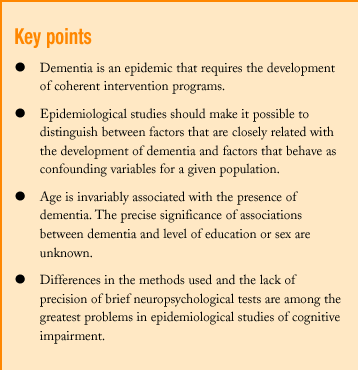Dementia, and specifically Alzheimer´s disease, constitutes a twenty-first century epidemic. Editorials like this one are frequent in the press and in scientific journals, and offer a mostly accurate picture of reality, as graying of the population is expected to increase the number of cases of dementia. As a secondary effect we can expect to see an increase in the number of dependent persons, with a consequent rises in social and health service costs. None of this is anything new; however, although this information has been available for some time, social and health programs aimed at providing solutions to the problem have not been developed. For this reason initiatives such as the Cuida´l Project deserve admiration and support, as the results shed light on a number of aspects of the epidemiology of dementias in Spain, and on the efficacy of possible interventions.
The results published by Limón et al confirm data from earlier international studies, but confirmation should not be considered redundant information, as it is important to provide a transcultural view of the situation. It is not a simple matter to identify all general phenomena which occur invariably with aging, or to determine which processes are fomented by age or aging, and how they are affected by socioeconomic conditions. What may be the case for one population within a specific ecosystem may not hold for another population.1 This is especially important in the study of dementias. Declining cognitive function is a continuous process throughout life, which can give rise to disability or illness when the decline surpasses what are considered the normal thresholds. Multiple protective, predisposing or precipitating factors influence the transformation of a physiological decline in intellectual functioning into disability or dementia.
Epidemiological studies in different populations should help to identify those factors which are essential from those which behave as confounding variables.2 Education, lifestyle (a difficult factor to define and categorize) and cardiovascular risk factors, all of which are interrelated, have been investigated as independent factors that influence the appearance of dementias. A higher level of education appears consistently as a protective factor in studies of different populations, and the reasons for this have yet to be clarified. Exactly why higher levels of education or previous intellectual work-out protect against cognitive impairment is not known. This may be a characteristic of the cohort effect within a given population; in other words, an effect that reflects exposure of the population to other risk factors in previous years that may or may not influence the development of dementia (the higher the educational level, the fewer unhealthy behaviors). Cognitive impairment may also be more likely to occur in persons whose central nervous system has not been reinforced by prior training. In other words, a situation of «impairment from the nonstimulation of cognitive reserves» might emulate «pathologies arising from disuse» that increase the central nervous system´s susceptibility to the action of other stress factors. Nevertheless, a third hypothesis cannot be ruled out, according to which the incidence of dementia is lower in patients with higher levels of education because of their capacity to perform better on short neuropsychological tests.2,3 Only the results of a series of longitudinal studies will clarify this issue.
It is no surprise that the results of the study by Limón et al confirm earlier findings that established a clear relationship between age and cognitive impairment. Age may be a factor that determines how much time is necessary for noxious factors to damage intellectual functioning. However, the lack of a relationship between cognitive impairment and sex contrasts with earlier findings from other studies. There is no clear biological evidence to account for the difference between sexes, or for the differences between men (or between women) from different populations. This raises questions that justify the need for further epidemiological studies.
Epidemiological studies are always beset by methodological difficulties in establishing a diagnosis of dementia on the basis of the results of a brief neuropsychological examination,4 and this in turn makes it difficult to compare findings across studies. Of note is the caution Limón et al have used to report their results in terms of «possible cognitive impairment», in view of the methodological limitations. We must await the findings for large series of cases of cognitive impairment diagnosed as dementia, and for all such persons who subsequently develop dementia on the basis of different cut-off scores on the Mini-Mental State Examination. Future stages of the Cuida´l study should also make it possible to identify other characteristics of the population, such as the influence of health care branding on consumer behavior, changes in family and care-giver profiles, relationships with other risk factors, and the capacity of the social and health care system to respond to the need for large-scale screening for dementia in primary care.









